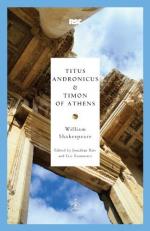|
This section contains 4,891 words (approx. 17 pages at 300 words per page) |

|
SOURCE: Waters, D. Douglas. “Shakespeare's Timon of Athens and Catharsis.” Upstart Crow 8 (1988): 93-105.
In the following essay, Waters contends that Timon is a tragic figure whose excessive feelings—such as kindness, joy, and friendship—cause his downfall.
Aristotelian criticism has often enlightened our understanding of Shakespeare's tragedies, but has, more often than not, judged Timon of Athens a failure as tragedy. In this play some critics see no moral significance and hence no tragedy mainly because it lacks, in their judgment, a dignified hero and catharsis as purgation of pity and fear in the audience—limitations which usually dwell only in the minds of the critics or which, even if they exist in the play itself, are not hindrances to it as a tragedy. In this essay I shall suggest another type of catharsis, catharsis as clarification of human experience, a view first set forth in English writings...
|
This section contains 4,891 words (approx. 17 pages at 300 words per page) |

|


